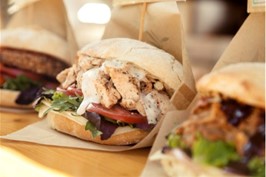Feed BC in post-secondary institutions
Feed BC in the public post-secondary sector is a partnership initiative led by the Ministry of Agriculture and Food with the Ministry of Post-Secondary Education and Future Skills, and 20 public post-secondary institutions (PSIs). 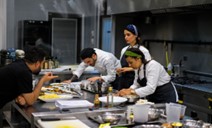
Through participation in Feed BC, universities and colleges showcase and demonstrate commitment to their sustainability goals and student interests in local food, and measurably contribute to the economic development and vibrancy of their local B.C. communities.
Since formally launching on campuses in February 2021 with the leadership and guidance of the Feed BC PSI Advisory Committee and the Administrative Services Collaborative, Feed BC has been working to expand program resources to support a partner Network and the participation and local food aspirations of public post-secondary Partners.
The Feed BC Post-Secondary Partner Program Action Plan 2023/24 -2024/25 (PDF, 855 KB) provides a roadmap of service offerings over the next 24 months that builds on the existing successes and the momentum to date.
The following PSI Partner Progress Reports highlight the work of universities and colleges across Feed BC’s partnership streams: tracking and sourcing more B.C. food, innovative local food initiatives, and local food education, promotion and awareness.
- Feed BC PSI Partner Progress Report 2024/25 (PDF, 2.7 MB)
- Feed BC PSI Partner Progress Report 2023/24 (PDF, 4.3 MB)
- Feed BC PSI Partner Progress Report 2022/23 (PDF, 1.7 MB)
- Feed BC PSI Partner Progress Report 2021/22 (PDF, 12.2 MB)
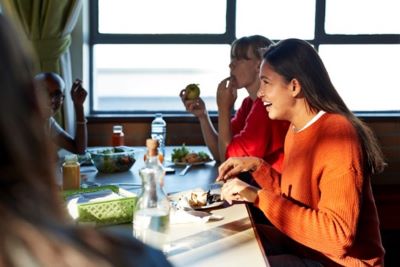
Local food stories – Our post-secondary partners
Feed BC’s public post-secondary institution partners are strong supporters of local food and food system sustainability. Using goals and measures that reflect the values and vision of their institutions, they are actively supporting Feed BC. Read their local food stories here.
British Columbia Institute of Technology
As a partner in Feed BC, making a shift to more B.C. food is a natural alignment with the British Columbia Institute of Technology (BCIT) and its Sustainability Vision. The vision consists of a comprehensive framework that integrates sustainability through all of the Institute’s core functions - education and research, campus operations, and community engagement.
BCIT’s first focus for bringing more B.C. food to campus is through campus food services and operations. Together with their contracted food service provider, Chartwells, BCIT is committed to working towards a minimum of 30% B.C. food expenditures. By offering more locally sourced foods, BCIT is meeting student demand for local, healthy and safe food options while helping to build a sustainable food system. By purchasing more B.C. food, new opportunities are made possible to directly support the social and economic prosperity of communities and the agricultural industry throughout the province, while addressing environmental concerns associated with long distance food transportation. BCIT is involved in research and development in the food and beverage industry. With expertise in food technology training, food safety, product development and commercialization, the Institute continues to be a prominent collaborator with B.C. food and beverage processors. BCIT is also home to the Natural Health and Food Products Research Group (NRG) which addresses issues such as product quality, process improvement and human health. NRG’s research and development is tied to the priorities and policies of the provincial and national natural health product, food and agricultural industry, and government agencies that regulate these sectors. The group's goal is to ensure that all Canadians can achieve the potential health and economic benefits offered by medicinal plants, natural health products, and the food industry.
During the COVID-19 pandemic and as on-campus education and services begin to restore, BCIT is committed to exploring more ways to continue to bring more B.C. food to campus.
Some of BCIT’s current local food suppliers and partners: Avalon, Caffe Agra Tandoori, De Medici, JJ Bean, Monte Cristo Bakery, Natura Plant Based Foods, Pacific Sun Produce and Spice Mantra.

Camosun College
With two campuses in Greater Victoria on Vancouver Island, Camosun College is one of the largest colleges in British Columbia and a strong proponent of using locally sourced food. With food as one of four key priorities in its Sustainability Action Plan, Camosun aspires to exemplify and educate about sustainable food through food services (cafeterias, cafes, catering, etc.), culinary arts programs, and sourcing, tracking and purchasing local as much as possible through local farms and growers and food grown on campus.
As a Feed BC partner, Camosun College is committed to increasing B.C. grown and processed food. The college supports local farms and businesses by sourcing directly from them for the college’s Culinary Arts program and is an early client of the new South Island Farm Hub distribution network. In addition to supporting local, this is a valued learning activity for Professional Cook apprentices, creating the next generation of local food advocates and reinforcing quality, seasonality and adaptability. Success in the competitive culinary arts marketplace requires, among other things, exceptional ingredients and strong connections with diners and suppliers alike. In educating new food service professionals on the importance of supporting local, they help graduates stand out in the marketplace and deliver products and services that demonstrate exceptional community commitment. Additionally, the financial resources circulated locally have significant impact as opposed to those dollars leaving the region.
Camosun College is committed to the local food supply network and advancing Feed BC by supporting local farmers and educating students about the benefits of using local food, strengthening local economies and supporting their own success. These learning opportunities place Camosun’s work at the heart of local food systems now and in the future.
Some of Camosun’s current local food suppliers and partners: Saanich Organics, Mandalyn Farms, Michell's Farm, Sea Bluff Farm, Sun Trio Farms and The Greener Side. For a full list of local processors and producers, please visit https://www.sifarmhub.ca/.
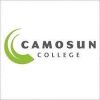
Capilano University
Capilano University (CapU) is committed to advancing locally produced and B.C. grown food on its campuses. Health and well-being are a cornerstone of the University’s culture. As a result, the University is creating a campus community that values sustainable decisions and actions for a better future. CapU strives to minimize its ecological footprint by engaging with local community partners, including food suppliers. Sourcing local food is one of the many ways that CapU “lives its values” of sustainability.
Sustainability is a key focus for the University and its 15-year food services partnership with Chartwell’s.
Already, CapU has achieved 33 – 36% of total food expenditures purchased within B.C., surpassing the initial Feed BC aspirational goal of 30%. Work is underway to explore and attract new B.C. suppliers and recipes that use local ingredients. In the post-COVID recovery period, the University aims to build on its success and grow the number of local food offerings in the menus and dining options on campus starting in Fall 2021.
CapU has strong student and employee engagement with its food services. The University’s joint sustainability committee contributes to, and supports, CapU’s food forward culture on campus, including key interests in local food options, fair-trade certified, salad bars and Ethical Bean Coffee roasted locally in Vancouver. The University holds regular consultations and practices joint decision-making with respect to operational priorities and funding for student-led sustainability initiatives. CapUWorks is one example, the group delivers campaigns and events to promote sustainable action and awareness on campus, and embeds a culture of conservation and consciousness in the CapU community and beyond.
Situated at the foot of the North Shore mountains, CapU’s campus community garden provides an educational and recreational activity that contributes to increased food security, community development, campus space enhancement, environmental sustainability and social inclusion. This is another direct reflection of CapU’s sustainability and wellness values, and reinforces the importance of local food and agriculture to students and the community.
Some of CapU’s current local food suppliers and partners are: Sysco, Ethical Bean Coffee, UNFI, Snowcap, Trimpac Meats, Centennial Foods, El-Comac Tortillas, Mikuni Wild Mushrooms and Wismettac.

Coast Mountain College
Coast Mountain College (CMNT) is nestled in the rich and diverse communities of B.C.’s beautiful northwest region. As a new Feed BC partner, CMNT is committed to exploring new opportunities to source locally and expand on food initiatives through networking with surrounding institutions.
Advancing local food education is of high importance for CMNT. The West Coast Culinary Diploma is an experiential program which is designed to help prepare students for a career as a Chef by developing a strong understanding of local food sourcing and engaging students from the kitchen to the land. Students experience how to harvest, forage and process local and unique foods such as seafood, oolichan and wild game. Entrenched in cultures of the West Coast and a focus on food sourcing right to the table, students learn from experienced Red Seal Chefs and those who hold extensive cultural knowledge. Together with Feed BC, CMNT will continue to grow opportunities for more B.C. foods and beverages and support local farmers.
Some of CMNT’s current local food suppliers and partners: Day Break Farms, Sysco.
College of New Caledonia
College of New Caledonia (CNC) spans six campuses over the central interior region of B.C., serving 22 First Nations communities. CNC has recently partnered with Feed BC in a shared vision to increase local food on campus by exploring local food suppliers and connecting with other institutions around innovative food ideas and initiatives.
CNC is committed to taking a greener approach by increased efforts to reduce their carbon footprint and incorporate energy-saving and sustainable practices, such as the campus greenhouse. The 40 ft diameter geodome greenhouse on CNC’s Prince George campus serves as both a research and educational space for students and faculty to provide learning experiences in horticulture, cooking and wood architecture. As the climate in northern B.C. can be quite devastating for crops, this greenhouse has helped extend the growing season throughout the winter months. This project was funded in part through a $133,205 grant from Northern Development Initiative Trust.
This past summer, CNC began a partnership with the Professional Cook program to keep the greenhouse green and utilized by growing different varieties of tomatoes, peppers, cucumber, ground cherries, amaranth and green herbs. These ingredients were used in Kodiaks, a student operated restaurant that helps prepare students in the Professional Cook program for the fast-paced working environment of the restaurant industry and expand individual creativity with food. This initiative has been a great opportunity to grow some produce locally for the CNC kitchen and helps build Kodiaks’ reputation for fine dining with its diverse modern menu.
Some of CNC’s current local food suppliers and partners are: Meadow Valley Meats, Johnston’s, Kawano Farms, and Homesteader Meats.

Douglas College
Douglas College is eager to continue momentum towards its social, environmental and sustainability goals through its commitment to Feed BC and local food education, innovation and procurement.
With campuses located throughout Metro Vancouver, Douglas College is improving its urban campus through greener building features including campus food and pollinator gardens. New green spaces at the Coquitlam campus highlight flora from five British Columbia regions (Coastal Mountains, Caribou and Interior Plateau, Boreal Taiga, Columbian Rocky Mountains, and Southern Interior) and provide a learning opportunity for students, employees and community members.
An Aboriginal garden at Douglas College’s New Westminster Campus promotes cultural awareness and learning with plants offering both medicinal value such as tobacco, sweetgrass and sage. The Institute of Urban Ecology opened its Sol (Sustainability, Outreach and Learning) Garden on the Coquitlam Campus with the goal of educating the public about sustainable urban gardening practices. This garden is used by the User Network for Insect Biology in the Urban Garden (UNIBUG) at the College, which holds free community workshops on beneficial insects and biological pest control.
Douglas’s Urban Challenges Forum, a partnership between the College, the City of New Westminster and Simon Fraser University, offers opportunities for local community engagement, education and awareness on complex issues. This past spring, Douglas College hosted an online event “Urban Challenges– Feeding the City: Building Local Food Security” with a focus on building capacity to produce food in the Lower Mainland and stimulating dialogue about this important issue in the region.
As Douglas College continues to explore new innovative and educational opportunities around local food, in collaboration with food services partner Chartwells, the College is also committed to working towards a 30% target for B.C. food expenditures on campus.
Some of Douglas’s current local food suppliers and partners: BC Fresh Farms, Nana’s Kitchen, Weston Bakery

Langara College
Langara College is proud to be a partner in Feed BC, joining fellow public post-secondary institutions throughout B.C., to ensure sustainable food for now and future generations.
Langara serves more than 23,000 students annually and employs a workforce of approximately 1,500 faculty and staff across three locations in Vancouver, B.C. As Canada’s pathways college, Langara believes in also setting the standard when it comes to supporting local food systems.
As part of the College’s Strategic Plan, sustainability is integrated across Langara’s core business functions, from academics to culture to operations. A 2021 Sustainability Culture Assessment confirmed that Langara students and employees want sustainability to remain a top priority for its leadership, and the College continues to pursue new opportunities while strengthening existing relationships in this area.
Through its food services provider Chartwells, Langara aims to achieve a minimum of 30% B.C.-based food expenditures by buying locally sourced foods and supporting local food providers. Students and employees can access safe, healthy, and diverse food options that not only reflect the global representation on campus, but also the dietary preferences of the population (e.g., Meat-free Mondays).
Langara is also home to many green spaces, including a fruit garden, a community garden with apiary, and two pollinator gardens that are used for educational purposes and to enrich the community. Visitors are welcome to immerse themselves in the environment and encouraged to pick-and-eat. Garden plots are open to and cared for by students, employees and neighbouring residents. One plot is dedicated for use by the Langara Daycare as a way for children to learn about where food comes from at an early age.
Some of Langara’s current local food suppliers and partners include Fresh BC, Windset Farms, and Farmers Fresh Mushrooms.
About Langara College
Located in beautiful Vancouver, B.C., Canada, snəw̓eyəɬ leləm̓ Langara College provides University, Career, and Continuing Studies education to more than 23,000 students annually. With more than 1,700 courses and 130 programs, Langara’s expansive academic breadth and depth allows students of all ages, backgrounds, and life stages to choose their own educational path. Langara is also known as snəw̓eyəɬ leləm 'house of teachings', a name given to it by Musqueam, on whose unceded traditional territory the College is located.

Kwantlen Polytechnic University
Kwantlen Polytechnic University (KPU), located across five campuses in Richmond, Surrey and Langley, B.C., joined Feed BC in August 2021 with a shared interest in increasing local food awareness through food culture, sustainability, and food innovation on campus. KPU’s Ancillary Services has enhanced its student experience by creating a partnership with food service company Chartwells to create a customized approach to their food services to reflect the needs of the various campus communities.
Certified organic produce for the campus food system is grown by KPU students on Richmond’s Garden City Lands, just a stone’s throw from KPU’s Richmond campus. In the Bachelor of Applied Science in Sustainable Agriculture program, students experience hands-on farming with robust academic exploration of the science, ethics, philosophy and economics of sustainable food production.
KPU is home to some of the most distinctive and world-class programs and courses in sustainable agriculture and food systems available at Canadian universities. KPU’s Institute for Sustainable Food Systems supports regional food systems by providing information and support for farmers, communities and local businesses. The institute also offers two farm school programs, which each offer a season of experiential learning. The Tsawwassen First Nation Farm School is a 20-acre organic farm owned by the Tsawwassen First Nation and the Richmond Farm School is a five-acre organic farm in South Richmond.
Students in the degree program and farm schools all participate in weekly farmers’ markets and sell their food through other wholesale and direct-market outlets. They connect with industry and their local community through internships and partnerships with local businesses. Those who complete either the Bachelor’s degree or a farm school program can apply to try out a farm business concept at one of the small farmer incubators in Richmond and Tsawwassen managed by the institute. Those in the degree program also complete original experimental research projects, creating new knowledge relevant to sustainable agriculture.
KPU continues to be a key leader in its community through sustainability practices and the commitment to a minimum of 30% food expenditure from local suppliers.

Nicola Valley Institute of Technology
Nicola Valley Institute of Technology (NVIT), grounded in Indigenous culture, tradition, and knowledge, embodies the vision of local food. Recognized as an Indigenous Centre of Excellence, the institution’s mission, vision and values statements are about strengthening community and encouraging partnerships. NVIT’s newest partnership with Feed BC reflects the institution’s commitment to supporting and sourcing local foods within surrounding communities. Approximately 60% of NVIT’s current food purchases are sourced locally, demonstrating strong commitment to local businesses and the broader community.
Much of NVIT’s local food success comes from its dedication to tapping into the history of the Nicola Valley. As part of a provincial initiative to develop an Indigenous Professional Chef program, the institution’s Culinary Arts Professional Chef program launched in January 2019 to teach students the requisite skills to become level one Chefs with a focus on sourcing locally. Lead by NVIT’s former Red Seal Chef and trainer, Andrew George, and in partnership with Okanagan College, students of the program learn the importance of nurturing Indigenous plants and roots and other important aspects of traditional land use.
NVIT’s commitment to environmentally friendly choices is embedded across its campus. The institution’s Centre of Excellence in Sustainability includes a working greenhouse where micro greens and produce are grown for the culinary arts program. Serving multiple purposes, the greenhouse is also used to educate students on the use of traditional plants as food and medicines.
Some of NVIT’s current local food suppliers and partners are: Shulus Gardens (Lower Nicola Indian Band), NVIT Greenhouse, Nicola Valley Meats.
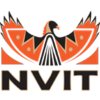
Okanagan College
Okanagan College (OKAN) is proud to be a Feed BC partner and a leader in innovation and community partnerships that bring local, fresh food to campus programs and services that celebrate the region’s food and agriculture diversity.
In the heart of the Okanagan Valley, the OKAN Culinary and Pastry Arts program in Kelowna focuses on a farm-to-table approach with a growing inventory of approximately 30% locally sourced produce, meat, and dairy from suppliers such as Colonial Farms and Bonanza Meats. New this fall semester, the updated delivery model for the culinary program will see students working in partnership with local farms, orchards, and wineries; this hands-on approach to learning teaches students the importance of supporting local producers and infuses the flavour that is unique to the Okanagan into their studies.
Collaborations with local partners also brings the agricultural community into the program kitchens. Plant-based tempeh from Vegilante has been added to the program inventory and Infusions menu. Owner Martin Rivard presented the students with plant-based alternatives and encouraged experimenting with different flavors and ingredients to use the tempeh in creating custom recipes. And the partnership with Okanagan Beekeepers continues to teach students how to extract, package, and substitute honey into recipes. Okanagan College honey is a must-have staple for many local restaurants!
Students are also presented with the opportunity to build seasonal menus using local ingredients with Infusions Restaurant. Special events such as the Student Chef Dinner Series welcome back OKAN alumni to lead the students in a special culinary showcase, sharing their experiences and talents in integrating local produce. Local wineries and breweries, such as Martin’s Lane, Fairview Cellars, Vanessa Vineyards, and Bad Tattoo Brewery have also been invited to pair with these exclusive menus. Infusions Restaurant continues to feature local wines, and beer, as well as non-alcoholic beverages such as Motherlove kombucha, and Karma fresh fruit sodas.
Teaching also happens in the K’nmaĺka? Sənqâĺtən (Kalamalka Garden) Indigenous Garden that was created through a collaboration between OKAN, the Okanagan Indian Band, and the Food Action Society of the North Okanagan. The garden grows local Indigenous food plants such as dandelion, stinging nettle, blue elderberries, and morels. Together with the Culinary and Pastry Arts program garden, students can plant and test a variety of freshly grown herbs, vegetables, and berries, and feature their harvest in various Infusions Restaurant menu items.
New this summer, Culinary Experience classes will offer Kelowna tourists an introduction to the flavours of the Okanagan region. Visiting local farmers’ markets and having a pairing and tasting lesson at a local winery, the day will wrap up with a one-of-a-kind cooking class that ties the day’s teachings together.
OKAN brings a passion and enthusiasm for local food to education, procurement decisions and partnerships, that are being passed on to student graduates, and the community at large, shifting food culture in the Okanagan Valley and across the province.
Local food suppliers:
- Colonial Farms
- Two Rivers Specialty Meats
- Bishops Seafood Company
- Bonanza Meat Packers
- Centennial Foodservice
- Vegilante
- Cherry Hill Coffee
- Specialty Bakery
Local suppliers featured at Sysco Kelowna of their current 135+ local BC suppliers:
- GFS
- Snowcap
- Bonanza Meats

Royal Roads University
Royal Roads University (RRU) is pleased to join in partnership with Feed BC and other post-secondary institutions throughout the province in a commitment to focus on local, sustainable food. Its goal is to meet “the needs of the present without compromising the ability of future generations to meet their own needs". Sustainability is often a challenge that calls for the kind of interdisciplinary and collaborative problem-solving at which Royal Roads excels.
The students, staff, and faculty of RRU learn, work, and live on the traditional lands of the Xwsepsum (Esquimalt) and Lekwungen (Songhees) ancestors and families who have lived here for thousands of years. Indigenous Peoples have harvested food and medicine from these lands, from both the ocean and the forest. The four-acre walled kitchen garden on the campus grounds help protect plants from deer and wind and create a micro-climate to help ripen foods efficiently.
Overall, the grounds and gardens play a role in supporting the education and hands-on learning of Horticulture students from Camosun each summer. In summer of 2022, Royal Roads proudly opened the Giving Garden as part of its commitment to food security in the community. The Giving Garden, in partnership with community organizations have given fresh produce to low-income seniors, single parents and new immigrants via weekly box programs and even a community fridge. By the end of the 2022 harvest, the Giving Garden program will have distributed an estimated 1,000 pounds of produce and plans to double the size and output of the garden in the future.
Locally owned and operated, Truffles Group is the food service provider and operator of the campuses Habitat Café. In 2021-22,Royal Roads reported that 66% of the institution’s food purchases are sourced locally and also continue to seek sustainable solutions to reduce waste.
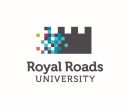
Selkirk College
Selkirk College’s commitment to sustainability is firmly rooted in the institution’s strategic plan (PDF, 1.6 MB) and is fundamental to its operations. As a Feed BC partner, the college is committed to continuing to support local and sustainable food systems, always looking forward to building new partnerships with B.C. food and beverage producers and processors. Through a range of local food education and procurement efforts across campuses and learning centres, Selkirk is proudly helping to reduce both environmental and social impacts of food production, grow agricultural businesses and local economy, and contribute to greater food security for the region and B.C.
Instructors in the Professional Cook Training Program have spent their careers both at the college and in the business encouraging a focus on a farm-to-table approach.
“It tastes so much better when the food is sourced from up the Valley,” says Chef Simon Parr, a veteran instructor in the program.
Included in the curriculum of the program are field trips to local farms where students are given an opportunity to explore food production on a deeper level. In classroom lessons, instructors place consistent emphasis on the importance of supporting local producers and choosing local products for both quality of menu items and satisfaction of guests.
Working within the constraints of budget and the realities of rural supply, both the Professional Cook Program and Food Services Department support regional and B.C. producers and processors whenever possible. Together with Feed BC, Selkirk College is excited to be growing opportunities for more B.C. food into the future.
Some of Selkirk’s current local food suppliers and partners: Linden Lane Farms, Legendary Meats and Kootenay Co-Op Grocery Store.

Simon Fraser University
At Simon Fraser University (SFU), sustainability is a core commitment that lays the foundation for local food procurement, programming and education, and SFU’s long-term goal to contribute to a vibrant and resilient local food system on campus and within B.C.
SFU takes pride as a Feed BC partner with an unwavering commitment to sourcing food locally and helping B.C. farmers, fishers, processors, businesses and suppliers to prosper. In addition to advancing tracking and sourcing towards a minimum of 30% food purchasing from B.C. and 25% locally sourced produce, SFU promotes local choices whenever possible for menus, marketing and events. B.C. eggs, poultry, seasonal root vegetables, corn, blueberries and fair-trade ingredients are just some of the foods currently sourced from local farms and suppliers.
SFU is committed to building partnerships with local food businesses like Nemesis Coffee at the Vancouver campus and Burnaby's Renaissance Coffee that sources fair trade beans from a Nanaimo roastery. Programs such as Radius Accelerator provide support, connections and education to grow B.C. food brands and social enterprises in communities throughout the province. SFU’s Embark Sustainability Program supports food system change through on-campus activities such as food rescue, community kitchen, and farm to campus which provides SFU students with fresh local produce. SFU’s Food Systems Lab is a research and innovation hub working on evidence-based solutions to support a sustainable food system that enhances ecosystems, conserves natural resources, mitigates climate change, and promotes food security.
SFU is driving a shift in culture through building ways to celebrate, support and connect the university community through local, healthy food. With programs like community gardens and food box programs at Surrey’s TD Community Engagement Centre and supporting Klemtu in achieving local, sustainable food production with Nutrition through Engagement and Agricultural Technologies (N-EAT) project, SFU is a committed leader in education and food systems transformation.
Some of SFU’s current local food suppliers and partners: Vikram Vij , Ethical Bean, Portofino Bakery, Kam's Bakery, El Comal, Local Food Trucks, Discovery Organics, Monte Cristo Bakery

Thompson Rivers University
Sustainability is a core value at Thompson Rivers University (TRU) campuses in Kamloops and Williams Lake. As the first Canadian college or university to earn two platinum Sustainability Tracking Assessment and Rating System (STARS) rankings, the university strives to lead the way among Canadian institutions.
TRU has long prioritized buying local food, reflecting student interest and demand, and the university’s sustainability values. TRU has found opportunities to support local food producers by increasing in-house cooking, tailoring menus to support seasonality around BC product availability and promoting local products on menus using special icons and identifiers.
Food services are a part of TRU’s sustainability efforts, from programs that encourage re-use of cutlery, to on-campus composting to water-filling stations for those who bring their own bottles and mugs, to being a proud Feed BC partner.
In its commitment to sourcing local foods, TRU does on-campus promotions, such as Tasting Tuesdays, where a BC product is introduced on campus and samples are provided; or the semester showcase, where all local products from food services are featured at a booth.
TRU has reached the Feed BC goal of 30% B.C. food expenditures while working in partnership with its food service partner, Aramark, on new and innovative ways to maintain and even surpass that target.
TRU’s local food suppliers and partners include but are not limited to:
BC Suppliers — Healthy Hippo Candy, Rico ‘n Lalo Frozen Treats, Free Yumm Bars, Edna’s Cocktails, Farming Karma, Wise Bites, Happy Planet Smoothies, Vanderpool Eggs, Original Cakerie, Nanas, Dairyland, Hallmark Chicken, Tega Tea, Sun Rype and numerous produce suppliers from the Okanagan.
Kamloops Suppliers — Fresh is Best Salsa, Twisted Goat Coffee, Afrofusion, Jill’s Café (locally made bannock) and Woodward Cider Co.

University of British Columbia
The University of British Columbia (UBC) is a proud Feed BC partner with a longstanding local food commitment that supports local economies, land stewardship and food transparency.
Food Vision & ValuesFood Revolution guiding document has been a key component to helping shape and inform ongoing decisions that prioritize local food, from culinary to purchasing, right up to senior leadership - in particular when faced with additional and competing pressures. This document also helped shape UBC’s “” which is a food manifesto of commitments such as real food, nutrition education, local ingredients, food safety and food recovery.
This past year UBC Food Services has launched its Local Supplier Spotlight program. In this program UBC Food Services’ showcases small scale local brands who align with our Food Vision & Values. In Spring 2023, UBC welcomed Susgrainable, Living Tree, Kula, Save Da Sea and Brightside into the three residence dining locations to provide local offerings to students and guests. UBC Food Services looks to grow this project and expand the number of local food businesses that can be showcased.
Some of UBC’s current local food suppliers and partners: Golden Ears Cheesecrafters, Goodly Foods, Terra Breads, A Bread Affair, Milano Coffee, Boulevard Coffee, Earth’s Own, Ethical Bean Coffee, Hardbite, Milano, Goodly Foods and the UBC farm. For the full list of local processors and producer sourced, please visit the UBC website.

University of Fraser Valley
The University of Fraser Valley (UFV) brings its passion and commitment to local food with the student experience on campus, through research and partnerships, and by active community engagement. As a Feed BC partner, UFV is committed to strengthening food systems through working to foster B.C. agriculture innovation and build local food culture, while leveraging its location in some of the world’s most fertile farmland to source local products from farms and food processors.
Together, with food services partner Dana Hospitality, UFV is focused on a made in-house, locally sourced menu ranging from bread made in Delta, cranberries from Richmond, dairy sourced in Fraser Valley farms, and local beef. UFV are leaders with Dana Hospitality to develop procurement policies and certification requirements that ensure and support market opportunities for B.C. producers and processors, including the use of provincially inspected meat. The institution is currently tracking and sourcing B.C. food towards a goal of 30% with the support of Dana Hospitality.
In 2019, UFV hosted a Fraser Valley Food Symposium that brought together more than 100 people from the local food community. The purpose of the symposium was to increase competitiveness among producers, food processors, and chefs by creating a Fraser Valley food culture and making a case for certification that will help to identify products and expand the market share. UFV is also the home of the Food and Agriculture Institute (FAI) policy and applied research aimed at strengthening the food system through a focus on technology, knowledge, and skills to the agriculture sector in the Fraser Valley and beyond. Building support networks and researching value-added products are focuses of this institution and will contribute to the growth of the social, cultural, and economic development of the Fraser Valley region.
Some of UFV’s current local food suppliers and partners: Britco, Monte Cristo Bakery, Johnston’s and Hallmark and Sunrise Poultry.

University of Northern British Columbia
Feed BC is an initiative that hits close to home for the University of Northern British Columbia (UNBC) which takes pride in being Canada’s Green University. Food education, initiatives and partnerships are key areas in which UNBC demonstrates leadership and continual improvement, and reflects its sustainability, environmental and social values and goals. Through local food production and procurement – and active student engagement – UNBC is supporting B.C. agriculture and food businesses located in and around the Prince George campus, community and region.
Starting in fall 2020, UNBC began working with new on-campus foodservice provider, Dana Hospitality, to expand UNBC’s use of locally processed, raised, grown and produced food. For example, Dana Hospitality has partnered with North Roast Coffee, a small-batch coffee roaster – partially-owned by a UNBC alum located in Prince George, B.C. Through this exclusive provider partnership, all coffee served in their Agora Dining Hall and catering is roasted only minutes from campus.
Growing local is also important to UNBC, to bring local food to staff, students and visitors. Prince George Public Interest Research Group (PGPIRG) operates the on-campus garden, Farm for Thought, right next to Student Housing. In 2018, UNBC helped to expand the garden to increase food production and ensure more seasonal produce can be purchased, prepared and served in the Agora Dining Hall and be available for direct student purchase. Executive Chef Skylar Dennis of UNBC Food Services loves working with the freshest ingredients, whether harvested just a few steps away from his kitchen, or through supporting and purchasing from local farms and food businesses.
UNBC Food Services works in partnership with PGPIRG to provide education for students in the Agora Dining Hall on the benefits of eating local and sustainable food production in Northern B.C. UNBC’s Food Services Guiding Team, a multi-stakeholder working group, actively develops initiatives like these to engender sustainability across the UNBC community, bringing benefits to local food businesses and to students, staff, and visitors every day.
Some of UNBC’s current local food suppliers and partners: Fabulous Cakes by Jenn, CrossRoads Brewing & Distillery, Homesteader Meats, GarrenDenny Farms (PGFarmsDelivers), Birthe Miller Jams, Cariboo Growers Farm, and North Roast Coffee.

University of Victoria
Local Food Focus
UVic Food Services prioritizes and sources food and products that are grown, produced or originate locally. We source locally from British Columbia, including Vancouver Island, the Lower Mainland, and the Fraser and Okanagan Valleys.
The University of Victoria (UVic) is a global leader in environmental, social and institutional sustainability. As one of the six pillars of its Strategic Framework, the university is committed to promoting a sustainable future. UVIC’s Sustainability Action Plan outlines its sustainability goals and includes strategies, actions and associated metrics for research, academic programs, and campus operations.
As a proud Feed BC partner, UVic prioritizes and sources food and supplies that are grown, produced or originate locally in British Columbia. UVic believes that this ‘local first’ purchasing policy is a critical step towards meeting its sustainability goals.
UVic aims to increase local suppliers to more than 30% of its supply chain by developing new and existing partnerships with local companies, including Indigenous-led organizations. UVic is exploring its current local supply chain to identify and remove barriers and seek new opportunities to better promote locally sourced goods and products. In addition, UVic is developing a baseline understanding of how much of its food, products, and supplies are sourced locally so it can ensure it meets and ultimately exceeds its 30% goal.
UVic is committed to decolonialization and acknowledges with respect that the University of Victoria stands on the traditional territory of the Lekwungen peoples. As such, UVic’s Senior Culinary Team is working with local Indigenous chefs to trace, source and utilize local ingredients and to introduce traditional cooking methods and recipes for the campus community.
For more than 25 years, UVic has been home to the Campus Community Garden – a collaborative project between students, faculty and staff that promotes local, organic food production, education and community building. The aim of the garden is to provide an accessible space where members can learn and teach while fostering sustainable food production practices within the campus and larger local communities. It promotes the growth of healthy local produce and works to support the ecology of our area by planting local species and supporting pollinators.
All of these initiatives are part of UVic’s Local Food Focus – driven by its commitments to community, sustainability and accountability, and a greener, more sustainable future for UVic students, the university and the world.
Some of UVic’s current local food suppliers and partners: B & C Meats, Cakes Etc., Islands West, Irene’s Bakery, Portifino.

Vancouver Community College
Located in the city’s downtown core, Vancouver Community College (VCC) is part of the community’s social fabric and local food culture. Locally sourcing food is integral to VCC’s vision to inspire students and graduates who are socially responsible and community-minded with the ability to tackle real-world needs. Now more than ever, VCC is attuned to the economic and social benefits of supporting B.C. food within the local region which has been particularly impacted by the COVID-19 pandemic.
As part of education delivery, VCC actively seeks out locally sourced food for educational purposes whenever possible and is working towards new opportunities to broaden its scale and impact as a Feed BC partner. VCC is western Canada’s largest culinary school and the recipient of the “Best Professional Culinary School” in the Golden Plate awards, making the college world-renowned. VCC graduates have helped shape the city’s strong local food culture and the culinary program gives students opportunities to learn advanced techniques using innovative cooking technology.
Campus food services are currently under redesign at VCC with an anticipated return of services by fall 2021. VCC’s vision is to bring a local focus to food services and retail outlets that will continue to build partnerships with B.C. farmers, fishers and food processors within the Vancouver region and throughout B.C. and create more opportunities for VCC students, staff, faculty and visitors to access local food on campus.
Some of VCC’s current local food suppliers and partners: Inner City Packers and Meadow Valley

Vancouver Island University
Partnering with Feed BC brings more opportunities for Vancouver Island University (VIU) to advance their commitment to sustainability through local food on campus, and in the communities they serve. VIU’s food values include local, healthy and plant-based which shape the foundation of their food services menus and student engagement activities and inspire their culinary arts programs and restaurants. Using a flexible procurement approach, VIU directly purchases up to 30% of their food expenditures directly from smaller, regional food businesses such as Cow-op, a Cowichan Valley non-profit farmer and food processor co-operative.
In early 2021, VIU Food Services launched a highly successful Friday evening family style take-out meal program. “We ended up feeding 1,000 people and decided this was a great opportunity to try out local suppliers as we rebuild our menus for next year,” says Michael Taylor, Kitchen Manager. Fredrich's Honey was featured in a smoked honey BBQ pulled pork dinner with a honey mandarin coleslaw and each meal included a jar of honey for customers to take home. VIU will be showcasing new local food suppliers each week until the summer with their vision of growing local food options when on-campus education and activities return. On top of paying retail prices, VIU produces free co-branded online and print marketing collateral featuring the companies.
This spring, with the support of the B.C. government, VIU announced the development of new food hubs to strengthen food security on Vancouver Island, including a new Seafood Innovation Centre at VIU’s Deep Bay Marine Field Station. This is a positive step forward in continued innovation and technology research for the region’s seafood industry.
Some of VIU’s current local food suppliers and partners include:
- Nanoose Pie Factory
- Fredrich’s Honey
- Nesvog Sausages
- Saltspring Coffee

Sector partnerships
BCNET
Working together to bring more B.C. foods to campus vending
BCNET is helping B.C.’s post-secondary institutions achieve their local food goals with Feed BC, a provincial government initiative led by the Ministry of Agriculture and Food to increase B.C. foods in public institutions.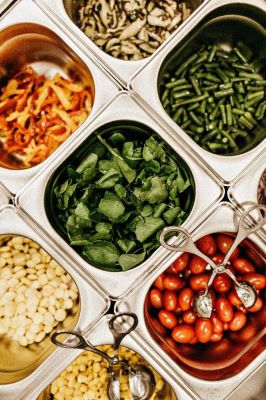
In September 2021, BCNET worked with Ryan Company to help formalize the company’s commitment to expand choices and feature more B.C./local food products in Ryan vending machines on B.C. post-secondary campuses. BCNET brings value and opportunity by consolidating demand and purchasing power for the benefit of member PSIs. BCNET worked closely with PSIs, Feed BC and Ryan Company to help the company respond to the growing interests in PSIs for more local, innovative snack products in campus vending machines.
Ryan Vending is actively working to identify and test potential new B.C. products with institutions in selected campus vending machines. The Ministry of Agriculture and Food’s Value Chain Innovation Service has provided support to help identify B.C. snacks and drinks suitable to the unique size, packaging and perishability needs of vending machines and foster new connections with B.C. suppliers.
Ryan Vending currently carries several B.C. products, including Spinnaker’s sodas, UnderGround kombucha, and Dan-D Pak snack mixes. Since starting to work with Feed BC, Ryan Vending has brought on new products including Victoria-based B.C. Better Seafood Supply Inc.’s Wild BC Pacific Salmon Jerky, Comox-based Hornby Organic Bars, and Surrey-based Hardbite Chips. In summer 2022, Ryan began the design and development of B.C. product vending machines for select post-secondary Partner campuses, increasing the scale of local food purchasing and opportunities for B.C. food businesses.
Feed BC in post-secondary partner resources
- Feed BC Partner Guide (PDF, 11 MB)
- The Feed BC Directory: A searchable B.C. food and beverage product database connecting B.C. institutional and commercial buyers with B.C. producers and processors.
- The Tips and Tools for Local Food RFx (PDF, 252 KB) is a summary tips and themes shared by Partners on effective ways to get better bid responses from potential food service vendors.
- Customized support for sourcing B.C. foods via the Value Chain Innovation Service.
- An Indigenous Processors and Suppliers list, showcasing several market ready Indigenous food producers and processors within B.C.
- B.C. Food Tracking and Reporting Template, used for tracking B.C. food expenditures.
- Feed BC Partner materials, including digital and physical banners, clings and chalk menu boards.
- Business-to-business initiatives including Pitch & Plate to connect and support collaboration between B.C public institutions and B.C. food products, distributors and suppliers through technology, match making and special events.
Feed BC Post-Secondary Reports:
- Study on B.C Food Procurement in B.C. Public Post-Secondary Institutions (PDF, 557 KB)
- Market Opportunities in the Post-Secondary Sector report (PDF, 385 KB)
- Contract and Procurement Scoping Report (PDF, 364 KB)
Post-secondary education snapshot:
- There are 25 public post-secondary institutions including universities, colleges and institutes located across B.C., with over 430,000 students.
- Post-secondary institutions offer a variety of food services and to meet the needs of a diverse student base including full meal programs at select institutions for students residing on campus.
- 52% of B.C. public post-secondary institutions currently house a culinary department.
News
On February 9, 2021, Lana Popham, B.C. Minister of Agriculture and Food announced the launch of Feed BC partnerships with post-secondary institutions Building opportunities for B.C. food with post-secondary partners | BC Gov News
On March 16, 2022, an additional 11 Partners were announced for a total of 20 public post-secondary institutions committed to bringing more B.C. food to their services and programs. Feed BC partnerships serve local food in more public post-secondary institutions | BC Gov News
